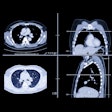
NEW YORK (Reuters Health), Aug 20 - Stenting is a feasible treatment for unprotected left main coronary artery disease (ULMCA) and is associated with good long-term outcomes, according to data from the Left Main Coronary Artery Stenting (LE MANS) registry.
In terms of the type of stent used, drug-eluting stents are tied to lower rates of major adverse cardiovascular and cerebral events than are bare metal stents, according to the report published August 19 online in the Journal of the American College of Cardiology.
Traditionally, ULMCA has been considered a major indication for coronary artery bypass grafting, Dr. Pawel E. Buszman, from the Medical University of Silesia in Katowice, Poland, and colleagues note. More and more, however, ULMCA is being treated with percutaneous coronary intervention. Although a number of studies have supported stenting as a treatment for ULMCA, long-term data have been lacking.
In the present report, Dr. Buszman's team describes the outcomes of 252 patients (mean age 68.5 years at baseline) who underwent ULMCA stenting and were followed for up to 11 years. Overall, 58% of patients had non-ST-segment-elevation acute coronary syndrome; patients with ST-segment elevation MI were excluded from the analysis. Drug-eluting stents were used in 36.2% of patients.
By 30 days, 12 patients (4.8%) had experienced a major adverse cardiovascular or cerebral event, including death in four patients. At 12 months, 17 cases (12.1%) of angiographically confirmed restenosis had been identified.
During long-term follow-up, 64 patients (25.4%) experienced major adverse events, and 35 died (13.9%). Survival rates at five and 10 years were 78.1% and 68.9%, respectively.
Although patients treated with drug-eluting stents often had worse clinical profiles at baseline than patients given bare metal stents, drug-eluting stents were associated with a lower rate of major adverse events: 14.9% versus 25.9% (p = 0.039). Further analysis showed that use of drug-eluting stents reduced both mortality and major adverse cardiovascular and cerebral events for distal ULMCA lesions.
The only significant independent predictor of reduced long-term survival was an ejection fraction less than 50%, the report indicates.
In a related editorial, Dr. Jeffrey W. Moses, from Columbia University Medical Center, New York, and colleagues comment that the LE MANS data indicate that stents are a safe and effective alternative to surgery for many patients. Nonetheless, they add, clinical practice will "remain suspended in the past" until guidelines are changed and physicians are no longer faced with a "conundrum of infrequently revised guidelines and appropriateness criteria based on outdated literature."
J Am Coll Cardiol 2009;54.
Last Updated: 2009-08-19 17:46:24 -0400 (Reuters Health)
Related Reading
Drug-eluting stents improve patient outcomes in routine practice, December 3, 2007
Copyright © 2009 Reuters Limited. All rights reserved. Republication or redistribution of Reuters content, including by framing or similar means, is expressly prohibited without the prior written consent of Reuters. Reuters shall not be liable for any errors or delays in the content, or for any actions taken in reliance thereon. Reuters and the Reuters sphere logo are registered trademarks and trademarks of the Reuters group of companies around the world.

















